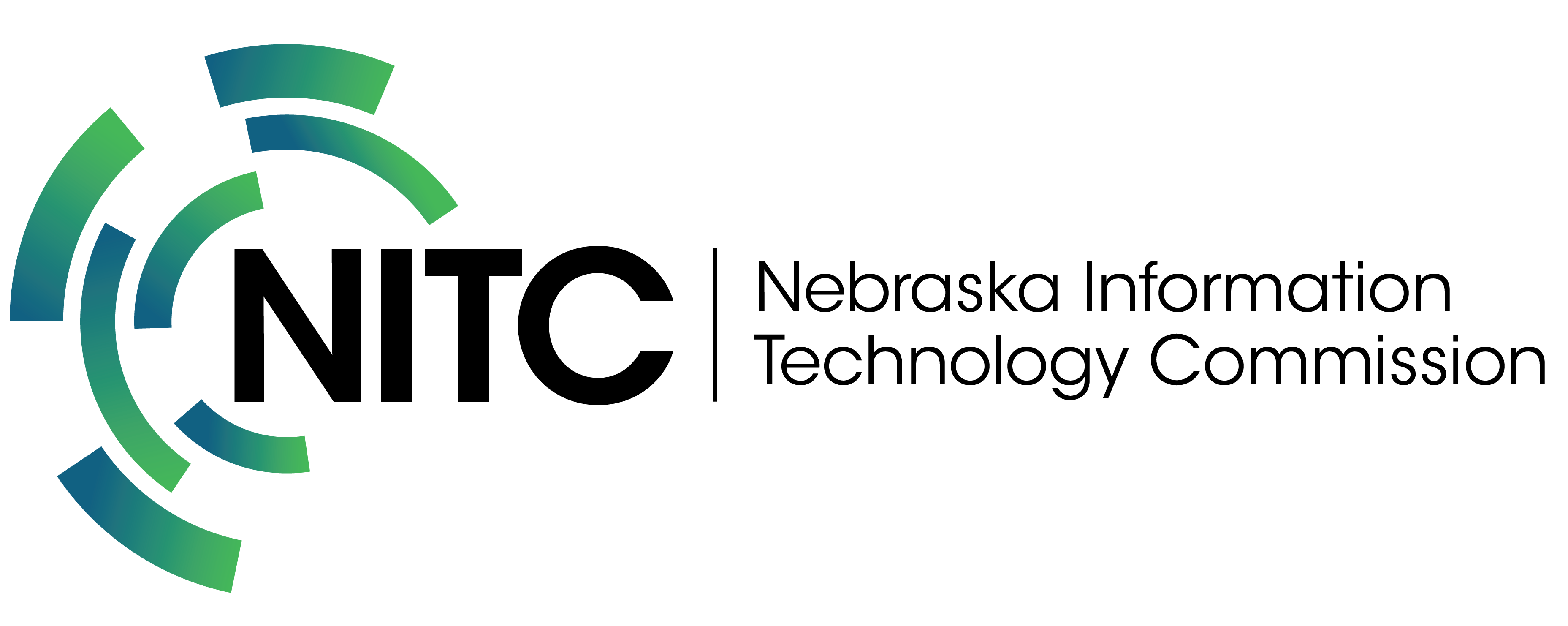Community Council
Nebraska Information Technology Commission
Thursday, May 27, 1999
University of Nebraska East Campus Union
APPROVED MINUTES
Members Present |
|
| Rod Armstrong, AIM Institute | Gerry Kluch, Kaystar Seed |
| Reba Benschoter, UNMC | Preston Thomas for Judi Morgan, Indian Affairs |
| Anne Boyle, Public Service Commission | Michael Nolan, Municipal Government |
| Jeff Grimes, Fasse Valves | Rick Nolan, Children's Hospital |
| Donna Hammack, Good Samaritan Fdn | Jeanne Saathoff, Nebraska Library Assoc. |
| Lance Hedquist, League of Municipalities | Craig Schroeder, Nebraska Rural Development |
| Kit Keller, Nebraska Library Commission | Ted Schulz, Nebraska Assoc. of Hospitals |
| Gary Kiel, PKS System Integrated | Gary Warren, Hamilton Telecommunications |
Members Absent |
|
| Jim Beatty, NCS International | Jim Lowe, Midwest Microsystems |
| Tyler French, Inacom | Russ Pankonin, Wauneta Breeze |
| Dave Hunter, Municipal Government | Greg Robinson, Government |
| Tim Lowenstein, NACO | |
Others present |
|
| Linda Aerni, Megavision (alternate for Michael Nolan) | Tom Rolfes, Office of the CIO/NITC |
| Laura Anderson, Omaha Metro Mediation Center | Steve Schafer, Office of the CIO/NITC |
| Rick Becker, Office of the CIO/NITC | Jen Soucie, Office of the CIO/NITC |
| Anne Byers, Office of the CIO/NITC | Michael Winkle, NITC Executive Director |
| Paul Ladehoff, Lincoln LancasterMediation Center | |
Call to Order and Minutes
The meeting was called to order by Co-Chair Donna Hammack at 1:35. Council members and guests introduced themselves. Ms. Hammack asked for corrections and/or additions to the April, March, and January minutes. Mr. Schroeder asked that his sector affiliation in the January minutes be changed from agriculture to municipal government. Mr. Armstrong motioned to approve, with Mr. Schroeder's correction, the minutes from all three meetings. The motion was seconded by Mr. Kluch. All were in favor. Motion was carried.
Guests were given the opportunity for public comment. None was given.
Steve Schafer introduced Anne Byers as the new Community Information Technology Manager. He then outlined how the committee's work today on setting sector priorities relates to the NITC's Policies and Procedures for Preparing the Statewide Technology Plan.
Michael Winkle charged the council with the task of setting sector priorities. He instructed the council to break up into small groups. Representatives of the business and agriculture sectors worked as a combined group. Libraries and municipal government worked together as a group. The third group consisted of healthcare representatives.
Gary Kiel reported the priorities of the business and agriculture sectors:
Business/Agriculture
- Improve the acquisition and retention of qualified IT personnel by business and agriculture.
- Encourage increased availability of affordable, reliable bandwidth to stimulate economic growth regardless of location.
- Increase awareness of opportunities in IT and encourage education needed to implement IT in business and agriculture.
- Establish baseline measurements with economic indicators.
- Create technical synergies.
- Foster new IT businesses.
Healthcare
Donna Hammak presented the healthcare sector's priorities:
- Ensure equitable access to healthcare services and education for patients and providers regardless of location.
- Promote the development of an infrastructure that:
- Is secure
- Is affordable
- Is user-friendly
- Allows high-priority access for emergency services
- Allows connectivity to various systems
- Has appropriate speed and capacity to support telehealth services and administrative applications.
- Pursue innovative technology applications that will provide the best and most economical solutions to individual telehealth needs.
- Identify and facilitate ongoing training which will ensure technology literacy for telehealth applications.
- Provide the security of long-term funding.
- Provide ongoing education to healthcare providers.
- Meet diverse community health information needs.
Municipal Government/Libraries
Craig Schroeder presented the priorities of municipal government/libraries:
They categorized their priorities into four broad categories:
- Access/Infrastructure
- Awareness/Education
- Applications/Use of Infrastructure
- Affordability
More specific priorities included:
- Awareness of IT and what it can do
- Access to technology regardless of geography
- Life-cycle equipment replacement--telecommunications and computers
- Training at all levels
- Consistency: equity of access
- Uniform technology language--everyone can talk to each other--interoperability
- Understanding of need for investment
- Municipal models of how technology is utilized to its fullest potential
- Best practices
- Minimization of regulatory inertia
- Need for public/private partnerships
- Use of public and private dollars to fund capital needs
- Regional collaboration of equipment, training, and policy
- Minimum of one community access point to electronic data
- Elimination of I.T. have's and have not's
- Need to involve libraries in state-wide planning
- Automatic meter reading, e-billing
- Balance between compatibility of infrastructure and dictated systems and software
- Access standards (i.e., 100 megabits speed at $40/month maximum needed )
- Interface between state and local governments
- Removal of regulations that reduce competition (i.e. LATAs)
- Stimulate and manage competition
- Tools to leverage public resources
- Market place incentives-- $ one option
- PBS
- Revisitation of how local and state policymakers make decisions to allocate resources--continual process
- Representation of underserved populations
- Hands-on learning center for technology in each community
- Info available to all communities and citizens
- Incentives to aggregate demand
Common Themes
Laura Anderson and Paul Ladehoff led the council in identifying common themes.
- Affordability
- Access/Infrastructure
- Applications/Use of Infrastructure
- Training/Workforce development and recruitment/Retention
- Collaboration and technical synergies (reaching a critical mass of I.T. professionals)
- Creating a political and regulatory environment conducive to I.T. development
- Sharing information ideas
The meeting was adjourned by co-chair Donna Hammack at 3:55.
Minutes taken by Jen Soucie and Anne Byers.
Meeting Minutes
